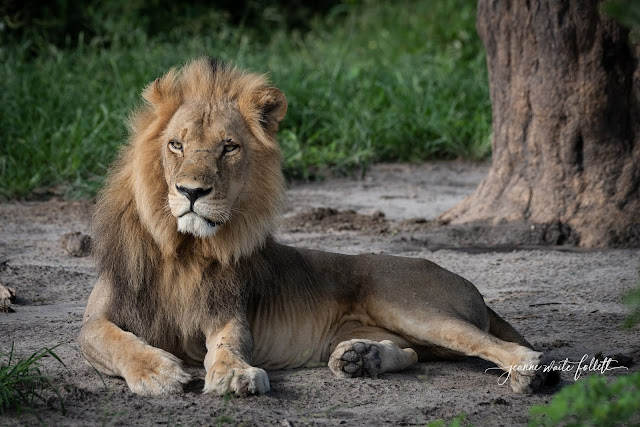Chapter 13
Running on Vervet Time
 We’re on a land safari
today in Chobe National Park. Lion
tracks were seen in the dirt on the road and our driver is following them.
We’re on a land safari
today in Chobe National Park. Lion
tracks were seen in the dirt on the road and our driver is following them.
We find the lions. It’s a breeding pair and both are sacked out
in the shade. We watch for a while and
then go back a short distance to a picnic area under a large tree.
 |
| The birds are the first to come looking for food. |
While we enjoy our tea or
coffee and cookies, I see some monkeys called vervets approaching. They swing up into the trees and soon are
perched above us and watching intently.
Vervets are small
monkeys, ranging from 16 inches to 20 inches, with the males being larger than
females. They band together in groups up to fifty or sixty.
 |
| Yes, this is a male. |
Research has shown that
vervets have distinct alarm calls for warning or predators.
From Wikipedia: Vervet monkeys have four confirmed
predators:
leopards, eagles, pythons, and baboons. The sighting of each predator elicits
an acoustically distinct alarm call.[19]
As infants vervets learn to make the variety of calls from observation alone,
without explicit tutelage. In experimentation with unreliable signalers,
individuals became habituated to incorrect calls from a specific individual.
Though the response was lessened for a specific predator, if an unreliable individual
gives an alarm
call for a different predator, group members respond as if the alarm caller
is, in fact, reliable. This suggests vervet monkeys are able to recognize and
to respond to not only the individual calling, but also to the semantics of
what the individual is communicating.[20]
It is believed that vervet monkeys have up to 30 different alarm calls. In the
wild vervet monkeys have been seen giving a different call when seeing a human
being approaching, leading researchers to believe that vervet monkeys may have
a way of distinguishing between different land and flight predators.
We
had fun photographing the monkeys for a while and then, suddenly, things
changed.
Some
vervets began coming down from the trees and moving closer to us while others remained
in the trees, maybe trying to distract our attention. The vervets have decided our break time is over and we should leave and let them scrounge for snacks.
One
climbed into our vehicle and searched the seatback pocket. It found an empty chip bag. It was empty and the vervet dropped it.
 |
| See how distracted Mary and Marg are? |
Others
tried to get into the cooler box where our snacks were kept.
Another
was on the roof of our vehicle. I didn’t
see it until I turned to go back and get something from the Land Rover. By that time, I was about five feet from
it. It hissed at me and I backed off.
We
left shortly after that.
 |
| A centipede on a long journey, |
 | |
| Lilac-breasted roller |
 | |
| Giraffe and friends |
 | |
| Lilac-breasted roller. |
 |
| Carmine bee-eater |
 |
| Fish eagle |
 | |
| Slender mongoose. |






















Beautiful photos, Jeanne. I didn't see any with you feeding the birds from your hands. You're good at that.
ReplyDeleteAmazing (to use your words) to see the 'small monkeys called vervets' with (see photo 12) amazingly LONG TAILS !! THEN to find they came right-on-in and you mean IN your vehicle to see what they could find to snack on (one with a chip bag photos 22 and 23 he / she discarded after finding it empty) and on the roof 'hissing at you !! I too would have backed off !! Photo 28 of the giraffe is a 'keeper', one super phenomenal photo. Yet another great post .. Smiles and Hugs Cap and Patti
ReplyDeleteFantastic pictures. I envy your life. Will live through you vicariously!
ReplyDeleteThank you for following along. I really appreciate the comment, too. Sometimes I fell like I'm all alone on this blog.
Delete